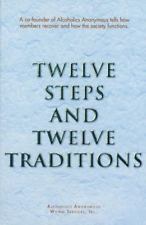
"An A.A. group ought never endorse, finance, or lend the A.A. name to any related facility or outside enterprise, lest problems of money, property, and prestige divert us from our primary purpose."

 |
Tradition Six "An A.A. group ought never endorse, finance, or lend the A.A. name to any related facility or outside enterprise, lest problems of money, property, and prestige divert us from our primary purpose." |
 |
Having found the answer for alcoholism, it seemed reasonable to early A.A. members to extend their mission to related areas rather than restrict their energies strictly to recovery efforts. Among the projects conceived were hospitals, education efforts, welfare programs for active alcoholics, drug addiction efforts and even legal and political reform. A great deal of money would, of course, be needed to carry these out. The scope and ambition of these ideas reminds us of the Big Book statement "Many alcoholics are enthusiasts. They run to extremes." (The Family Afterward, Page 125)
The author relates how the failed perfectionists of A.A., as he calls us, saw these efforts fall apart for various reasons. Too many cooks spoiled the broth when groups went into business. People became confused whether A.A.'s purpose was medical, educational, reform or another. Some allied enterprises were not good, and the implication is that the fellowship's reputation was at stake. Involvement in politics was also risky (per the Tenth Tradition as we know it today).
The conclusion reached by A.A. afterward:
These adventures implanted a deep-rooted conviction that in no circumstances could we endorse any related en- terprise, no matter how good. We of Alcoholics Anony- mous could not be all things to all men, nor should we try. (Page 157)An early test of this non-endorsement policy involved an man who was offered a position in the liquor trade. The offer came about because of his public relations value as a recovered alcoholic who could help show the industry's concern with problem drinking. Bringing the matter to A.A., there was no objection to his taking the job based solely on his abilities and alcohol experience (an issue revisited in the discussion of Tradition Eight). But his public identification as an A.A. member would be perceived as an endorsement by the fellowship of liquor industry education, and would also violate the principle of public anonymity laid down in the Foreword to the Big Book, later codified in the Eleventh Tradition. Though he was legally entitled to take the position, after much struggle the man decided to forgo the opportunity in the face of these considerations.